hr-television, 10.05 a.m.
Over fifty farmers, winegrowers, gardeners, bakers, cheesemakers, fish farmers, beekeepers and butchers offer their specialities twice a week at the Frankfurt farmers' market, all of which they have produced in the Frankfurt area. This makes the Konstablerwache market the largest farmers' market in Hesse and it is now impossible to imagine Frankfurt's city centre without it. It has long been a popular meeting place for locals, commuters, tourists, pensioners, bankers, hipsters and wine lovers. "Erlebnis Hessen" visited the market, talked to producers and met some of them on their farms.
rbb television, 3.55 p.m.
Over 1,000 kilometres of Brandenburg by bike - "Rad auf Achse" is on the road on Germany's longest long-distance cycle route, the "Tour Brandenburg".From Cottbus, Anja Ittmann cycles through her homeland in episode 2: along the Spree to Spremberg, through the Lusatian Lakeland to Bad Liebenwerda. The proud Sorbian is a Lusatian with body and soul. At the edge of Partwitz Lake, she tells of the loss of her home village: Groß Partwitz, which used to be here, has been swallowed up by the lignite dredger. In Bad Liebenwerda she meets a passionate winegrower who successfully produces old wine varieties in Brandenburg.
Bavarian Television, 5.25 p.m.
In Tauplitz in the Austrian Salzkammergut, the tradition around the maypole is different from that in Bavaria: here the maypole is decorated with pairs of straw dolls, is allowed to keep its top and can be cut down at night by lads from neighbouring villages. To keep the guards strong, the landlady of the "Gasthof Hechl" provides them with black pudding sausages. And at the "Erzherzog Johann" the chef spoils them with tender fillet steak. At the spring festival at Grundlsee in Ausseer Land, Styrian winegrowers serve their wines from the new vintage. Gourmets enjoy freshly smoked char from fisherman Karl Annerl.
ZDF, 7.15 pm
From the Black Forest they conquer the world: South German schnapps distillers turn out to be gin tinkerers and help their homeland to a new image. They combine the classic juniper schnapps with rather unusual regional ingredients like pine needles and Black Forest truffles. Florian Faude wants to make noble brandies hip again and tries to do so with pretty much all the raw materials he can grow or find himself in the region. With his developments, he has shown that gin also works on a raspberry basis and does not have to taste only of juniper. Iris Krader's gin tastes like roses, which she grows in her garden. Even before the gin hype started, she produced her own gin and expanded the vineyard she took over from her uncle. A risk that has paid off for her: Her gin is on the menu of top restaurants in Germany.
3sat, 10.45 p.m.
The Jura South Foothills line is one of the most beautiful railway routes in Switzerland. Along the French and German language border, the journey continues along the western shore of picturesque Lac Léman to Geneva. From Dreiseenland, the train heads south to Lavaux, Switzerland's best-known wine region. Between Vevey and Morges, the journey continues for a short stretch by boat across Lac Léman. The last leg to Geneva is again by train. Beautiful, but still largely unknown, is the so-called the Jura South Foothills line. The journey begins at Lake Biel. The train passes the southern slopes of the Jura, where the sun allows the vines to flourish. Heading south, the train meanders leisurely through the Fribourg region. After the tunnel at Puidoux, a beautiful sight opens up to the train passenger: The vineyards of Lavaux in the foreground, Lake Geneva shimmering blue behind, and the snow-covered slopes of Mont Blanc in the distance. The vineyard terraces of Lavaux have been a UNESCO World Heritage Site since 2007. Christelle Conne's family has run a vineyard here for generations and allows the film crew a look behind the scenes.
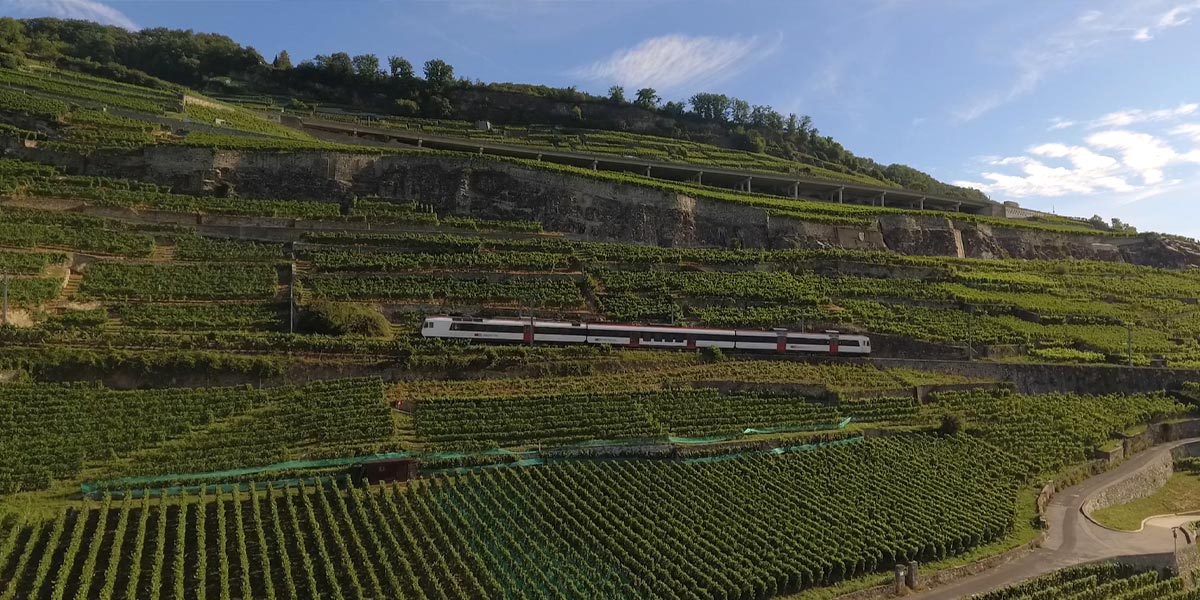 |
Bavarian Television, 3.30 p.m.
Marianne Kreuzer visits former world-class high jumper Carlo Thränhardt. The Munich native set three world indoor records in the 1980s and was the first person to jump over 2.40 metres. Today he still holds the European indoor record and the German outdoor record. Thränhardt, now 63, enjoys playing tennis and is an outstanding wine connoisseur. So he has chosen the all-weather tennis facility in Unterföhring and a wine tasting in Munich as his favourite places. His third favourite place is - as befits a high jumper - high up: on the Olympic Tower. Thränhardt has been friends with Boris Becker for decades and remembers special moments with the three-time Wimbledon winner. In a very emotional conversation, it is also about the death of his wife Konstanze, who passed away in 2019 at the age of only 49.
arte, 7.05 a.m.
France, the land of wine: hills full of vines characterise the landscape in many regions. But in some places the cultivation methods have exhausted the vineyards, again and again clearing has to be done in traditional growing areas. Some winegrowers are breaking new ground. They want to turn their production around to counter the decline of wine culture - with new ideas, with a sense of tradition and in harmony with nature. One who is fighting against the death of vineyards in France is the vine breeder Lilian Bérillon. He owns a vine nursery in Villeneuve-lès-Avignon, a small community in the south of France. His profession is rather unknown, but the quality of the vines he breeds determines the quality of the grapes that will later grow on them. "The situation is quite serious: in the past, vines were planted to last 80 to 100 years, but today they only have a lifespan of 20 to 30 years - modern viticulture bears part of the responsibility for this," says Lilian. He travels to wineries all over the country to develop customised solutions. The Beaujolais wine region north of Lyon is also going through a turbulent time. The controversial quality of Beaujolais nouveau has led the region into crisis. Here, Julien Merle, a young fifth-generation winemaker, has completely broken with previous cultivation practices. Together with his partner Nathalie, he works organically. The result is natural wines that are in vogue not only in France but worldwide. Will the "young savages" prevail?
3sat, 12.50 p.m.
"Isola verde" - "green island" - is what Italians call the volcanic island of Ischia. In ancient times, it was the first colony from which the Greeks conquered the Italian mainland. Shortly afterwards they founded Rome. It is said that culture came to Italy via Ischia: art, knowledge, philosophy and wine. The report shows life on Ischia and explores the clichés associated with the island in the Gulf of Naples. Author Simin Sadeghi drives around the island on a Vespa and chats with the various people about island life, (thermal) water and wine, about fumaroles, mud packs and about "La Merkel".
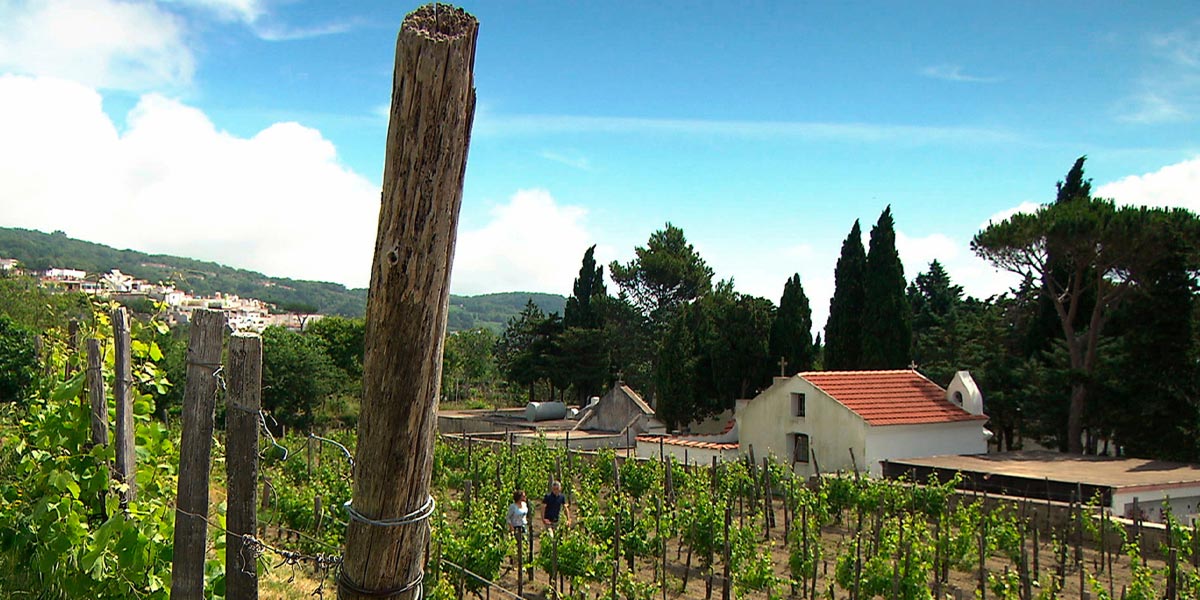 |
ZDFinfo, 6.45 p.m.
Pompeii becomes world-famous in 79 AD because of its destruction. But it is also the starting point for a little-known story of modernity. The documentary tells how things went on after the devastating volcanic eruption. It deals with the reconstruction of the destroyed region and the crisis management of the emperors, but also with economic recovery and criminal enrichment. For the crisis management, the first aid provided by the Roman administration as well as the "support programmes" seem impressively modern to us - even if the reconstruction dragged on for decades. After all, it was the excellent wine from volcanic soil that finally brought new prosperity to the region.
Bavarian Television, 10.45 p.m.
Things are getting more serious between veterinarian Kauth and Sophie (Caroline Peters). But there is no time for young love: the petty thief Arno Hümmel has been murdered. He was killed with a red wine bottle. It turns out that this bottle was of great value to wine lovers.
hr-television, 21.45
He only has one life, says Jürgen Krenzer, hotelier and restaurateur in the Rhön. And it should be less stressful. More fulfilled. That is why, in his mid-50s, he is taking a new approach and changing his business model. He only wants to cook for hotel guests to ensure good quality, with regional, sustainable products. Jürgen Krenzer concentrates on the hotel, on cider production and starts with organic farming. "Back to the roots," says Krenzer, because farming was part of the inn until the 1970s. The new model also convinces his son, who is now getting into the business with a chicken farm. herkules presenter Rebecca Rühl wants to know what motivated Jürgen Krenzer and visits him in the Rhön.
SWR Television, 5.30 a.m.
While wine and tobacco thrive in the Palatinate foothills, the soil in the Palatinate Forest is poor and yields little. Thus, the undemanding potato once became the staple food - until potato blight led to great famines in the 19th century. The forest has always been an important source of food: people gathered mushrooms, berries and chestnuts. Pigs foraged in the oak and beech forests. Leaves and moss served as litter in the stables.
3sat, 3 .40 p.m.
The Jura South Foothills line is one of the most beautiful railway routes in Switzerland. Along the French and German language border, the journey continues along the western shore of picturesque Lac Léman to Geneva. From Dreiseenland, the train heads south to Lavaux, Switzerland's best-known wine region. Between Vevey and Morges, the journey continues for a short stretch by boat across Lac Léman. The last leg to Geneva is again by train. Beautiful, but still largely unknown, is the so-called the Jura South Foothills line. The journey begins at Lake Biel. The train passes the southern slopes of the Jura, where the sun allows the vines to flourish. Heading south, the train meanders leisurely through the Fribourg region. After the tunnel at Puidoux, a beautiful sight opens up to the train passenger: The vineyards of Lavaux in the foreground, Lake Geneva shimmering blue behind, and the snow-covered slopes of Mont Blanc in the distance. The vineyard terraces of Lavaux have been a UNESCO World Heritage Site since 2007. Christelle Conne's family has run a vineyard here for generations and allowed the film crew a look behind the scenes. Caption: Lavaux_ Winemaker.jpg
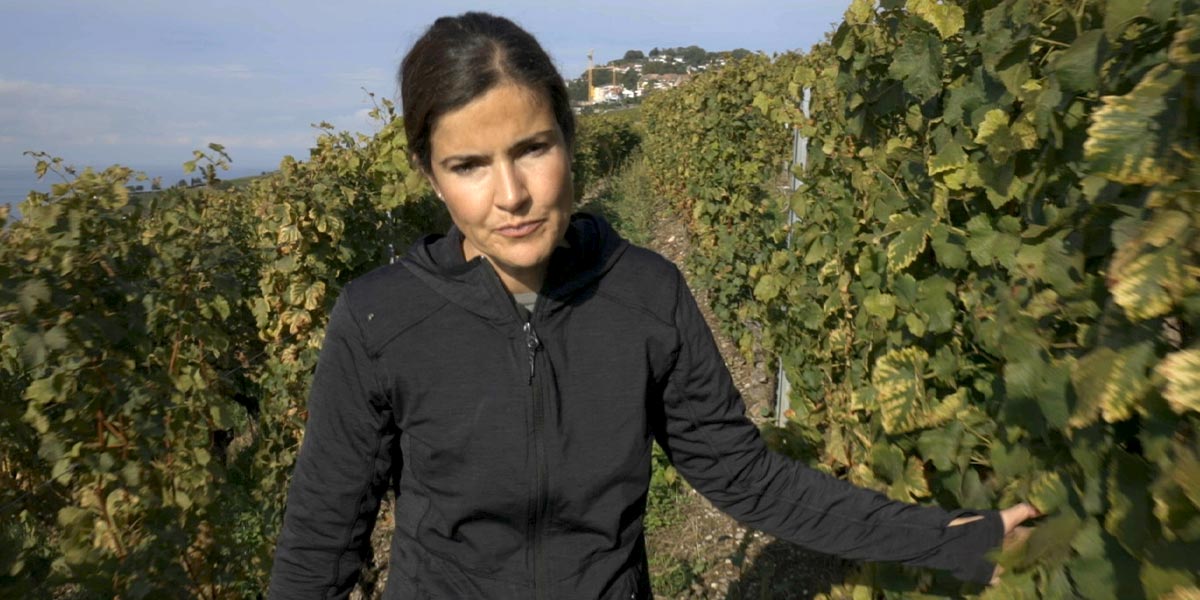 |
Bavarian Television, 7.30 p.m.
From all Bavarian regions, stories are told about work in the countryside and the people who do it every day with machines and implements. Arable farming, orchards and vineyards, forests and meadows: Only through the work of the people does it become a cultural landscape that can yield profit, but which requires a lot of heart and soul, commitment and optimism. With depth, a portion of humour, empathy and objectivity, a documentary view and great pictures: The Bavarian working world, the love of vintage cars, the machinery of large and small farms, organic farming and Agriculture 4.0 are shown.
hr-television, 8.15 p.m.
A rbb television team travelled all over the Alpine region and found 50 reasons to love South Tyrol. They travel to Merano, Bolzano and Bressanone as well as to breathtaking mountain and valley landscapes. For many, South Tyrol is one of the most beautiful regions in Europe. In St. Magdalena there is a meeting with the new Bacon Queen at the South Tyrolean Bacon Festival. A visit to the bread market in Brixen shows how the crisp Schüttelbrot is still handmade today. The region has a lot to offer in terms of cuisine anyway: Grey cheese and bacon dumplings, apple strudel and marble cubes are just a few specialities. One of the oldest types of wine, Gewürztraminer, comes from the small town of Tramin.
3sat, 6.00 a.m.
Mount Etna is one of the most active volcanoes on earth. With a mighty height of over 3300 metres, it dominates Sicily. This is a portrait of one of Europe's most fascinating natural wonders. Locals show how they have learned to live with the dangers of "Mama Etna". This is how the Sicilians affectionately refer to the volcano that constantly threatens them. Winegrower Chiara Vigo remembers how she had to experience as a child that an eruption in the north destroyed almost all of the family's vineyards: a catastrophe. Because even today, there is no insurance against it on Etna. She will never forget that the lava flow left a remnant of the belongings and "miraculously" changed direction. Together with her husband Gianluca, she now grows the "Nerello Mascalese" here, the typical red grape variety of the approximately 130 vintners on Etna. The mineral-rich volcanic soil makes it possible to grow wine, olives, pistachios and many other things that make up Sicilian cuisine.
WDR Television, 2.05 p.m.
The Neckar is a destination for romantics: half-timbered houses and medieval towns line its banks, gentle hills and valleys alternate with vineyards and steep rock gardens. High above the river, castles remind us of the region's eventful past. Andrea Grießmann travels the Neckar from Heilbronn to Heidelberg - sometimes on the White Fleet, sometimes in the sidecar of a historic motorbike and sometimes by bicycle.
SWR Television (RP), 6.05 p.m.
Bodenheim looks beautiful and homely. Vines, half-timbered beams and old courtyards dominate the town centre, and wine taverns invite you to linger. Normally. Because at the moment they are closed due to the Corona restrictions. The shops and wineries in Gaustraße also have to deal with the crisis. Three years ago, the "Landesschau" already visited Gaustraße. At that time, the residents reported on their plans for the future. In the meantime, they have invested money, built, changed and modernised. Even though the new wine shops of the wineries at the end of the village invite visitors to linger, they are not allowed to offer wine tastings. But sales continue at their wineries as well.
SWR Television, 8.15 p.m.
The Palatinate Forest is Germany's largest contiguous forest area and, together with the Northern Vosges, forms a cross-border UNESCO biosphere reserve - the habitat of many rare animal and plant species. As the seasons change, the SWR documentary accompanies people who have recognised the value of acting close to nature and who fight to preserve it. The nutrient-poor sandstone soil contributes to the fact that oaks grow slowly and their wood is particularly hard. Forester Burkhard Steckel is master of the "million-dollar quarter" where Germany's most expensive oaks thrive. Many a trunk fetches more than 10,000 euros at the annual timber auction. Winegrowers' family John let their wine mature in barrels made of Palatinate oak. Their wines benefit from the climate on the edge of the Palatinate Forest and are now among the best in Germany.
hr-television, 10.05 a.m.
South Tyrolean farmers, once simple folk, serve up lavish fare at their regional festivals and enjoy traditional dishes. The bread and strudel market in Bressanone, for example, is one of the most beautiful culinary festivals in South Tyrol. In Villnös, in the Eisacktal region, the Speck Festival is held. Here you can find South Tyrolean bacon in many recipes and variations. Bacon dumplings, napkin dumplings, grey cheese dumplings, plum dumplings and Lenten dumplings play the main role at the dumpling festival in Sterzing. South Tyrolean wine - Vernatsch, Lagrein or Terlaner - flows at all the festivals.
Bavarian Television, 12.20 p.m.
Lower Franconia - many people think of vineyards, wine festivals, picturesque vines. But also of beer? Many assume that somewhere else. But Wine Franconia is also Beer Franconia, as shown in the film. This includes the Faust brewery in Miltenberg with what is probably Germany's oldest inn. "There is a beer recommendation with every meal," says owner Johannes Faust. With its own brewing course for women, Faust wants to get them excited about beer. The Pax Bräu in Oberelsbach: Andreas Seufert's beers are in demand nationwide, for example when he adds ginger or hazelnuts to the brewing kettle. Friedrich Düll has to hold his own with his Krautheim beer in the middle of the Kitzingen wine district. His credo is regionality - especially when it comes to raw materials. Around his brewery, grapevines are in the minority, while malting barley is much more prevalent - as it is, incidentally, throughout Lower Franconia. Düll is one of the last breweries in Bavaria to still operate its own malt house. For Frank Engelhardt in Seinsheim, it's not the price that counts when it comes to buying beer, but ordering in advance. Without it, nothing works at his Kellerbräu. Every Friday he brews 240 litres. On the same day, the brewery's small bar is also open. Fresh from the barrel, there are dark and light beers - and bottled beer to order.
ZDFinfo, 12.45 p.m.
The ability to prepare food over a fire is as old as mankind. But it took thousands of years to create the menus we know today. Every era had its recipes, ingredients and techniques. Christian Rach presents them. For many centuries, it was impossible to imagine a refined table without wine. At Eberbach Monastery in the Rheingau, Christian Rach learns what it meant to pick grapes by hand and press them in wooden wine presses. The consumption of wine and also beer used to be higher than today because of the often poor water quality.
hr-television, 6.00 p.m.
Half-timbered houses and big cities, natural and cultural landscapes: you can find it all on the Hessian river kilometres along the Main and Rhine. Seligenstadt with its charming old town, Hanau with its castle, Offenbach with its long leather tradition, Frankfurt with its high-rise buildings, Hochheim surrounded by vineyards and finally the place where the Main - opposite Mainz - flows into the Rhine. Nature reserves spread out along the Rhine in the south of Hesse. The tour passes Wiesbaden, the capital of Hesse, through the wine-growing Rheingau region with its venerable St. Hildegard Monastery, the tourist magnet of Rüdesheim, and on to the state border at Lorchhausen - an adventure for all the senses.
phoenix, 0.45 a.m.
The route leads along the Rhône to Arles and Avignon. One stop is the wine-growing region near Châteauneuf-du-Pape, where winemaker Patrick Brunel grows the Mourvèdre grape variety. It thrives well near rivers, as the water masses ensure a balanced temperature.
ZDFinfo, 3.00 p.m.
Many foods are traded internationally, imported - and mixed with each other: honeys of different origins end up in the same jar. Wine or olive oil in a bottle can also be from different producers in different countries. The more that is mixed, the greater the danger of counterfeiting. And the longer and more opaque the supply chains are, the easier it is for counterfeiters to cover their tracks. The documentary accompanies the inspectors on their search for clues. How much safety can they guarantee? The Federal Association of Food Inspectors (Bundesverband der Lebensmittelkontrolleure) criticises that food inspection in Germany can only fulfil its legal mandate inadequately. The reason: a chronic lack of staff.
SWR Television, 8.15 a.m.
The southwest of Germany is not only a stronghold for thinkers and inventors. In Baden-Württemberg and Rhineland-Palatinate there are also a lot of strange records. Higher, bigger, faster, heavier or crazier - there is hardly a record that has not been achieved here. The biggest tree, the smallest registry office, the steepest vineyard, the biggest shoe, the fastest backwards runner and many other crazy records are united in a virtual museum.
MDR Television, 9.30 a.m.
Southern Alsace scores with the diversity of its landscape - from the vineyards on the Alsace Wine Route to the peaks of the Vosges Mountains and Mulhouse. The documentary shows how multifaceted the French northeast is, and it introduces people in whose everyday lives the Alsatian identity plays an important role. The film team visits a traditional manufactory for panoramic wallpaper, which offers a rare insight into production. On the Alsatian Wine Route, a winegrowing couple has opted for sustainable architecture in the construction of their farm and converted the business to biodynamic cultivation.
ZDF, 2.10 p.m.
In each episode of this emotional factual entertainment format, Giovanni Zarrella accompanies two people on their own personal hero's journey. The programme tells the story of people who break out of their everyday routine to realise a dream. But they don't do it for themselves, but for those who love them most. Unbeknownst to them, the heroes train for weeks and learn something that no one would have believed they could do. In an emotional finale, they then surprise their loved ones and cause amazement, emotion and joy. The "Secret Hero" Benjamin (23) has long regretted not keeping his promise to his grandmother to learn to play the piano. For her sake, he now wants to do so and accompany Giovanni on the grand piano to a song. Not exactly easy when you can't play at all and work as a winemaker at the same time.
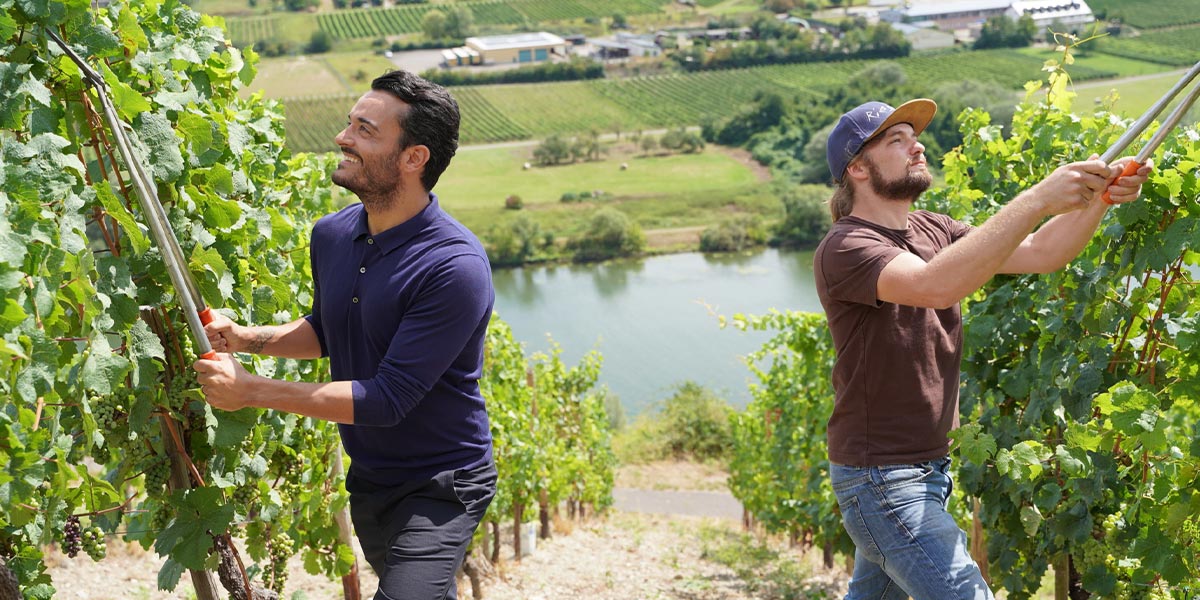 |
3sat, 11.45 a.m.
"Zur schönen Müllerin" in Frankfurt has been an institution for 120 years. Apple wine, Frankfurt cuisine and cosiness are the hallmarks of this restaurant, which was even sung about in a hit song. Host Torsten Dornberger invented the "green sauce in one piece" and a cake with black pudding and apples. The "Hessenschnitzel" is also popular with regulars and tourists. Things are quite different at the "Villa Merton" in the diplomatic quarter. The villa with park is home to a club and star chef André Großfeld. He combines top gastronomy with Hessian cuisine - after all, he cooked for years in Friedberg-Dorheim. In the gourmet restaurant, he spoils guests with a dessert variation in which Frankfurt's "Green Sauce" plays the leading role.
3sat, 2.45 p.m.
The holiday region of South Tyrol is nestled between the Eastern Alps and the Dolomites, where rugged mountains meet wine landscapes and the sun shines 300 days a year. By bike, you can explore the wine villages along the South Tyrolean Wine Road all the way to Lake Kaltern. And those who travel by bike may also taste one or the other wine with a clear conscience.
3sat, 16.30
Tuscany is one of Europe's longing regions that attracts many tourists. Nevertheless, there are still unknown spots in the south of Tuscany, far away from the tourist centres like Florence and Pisa and the wine-growing regions in Chianti. There, a fascinating environment forms the backdrop for people who tell their stories with Italian joie de vivre.
3sat, 11.45 a.m.
This time Martin Traxl and Lojze Wieser explore the landscape and cuisine of Kamptal and Wagram. The two neighbouring regions in Lower Austria are hotspots for cuisine and culture. What is served here is either home-grown or produced by the neighbour: For example, mushrooms grown in the loess cellar, raw ham and bacon from the in-house Turopolje free-range pig, goats, buffalo cheese specialities or freshly caught trout. The loess soils of the Wagram also provide fertile ground for Roter Veltliner, one of Austria's oldest autochthonous white wine grape varieties. Not far away, on the western slopes of the Manhartsberg and along the Kamp, especially Grüner Veltliner and Riesling thrive. They ripen in the depths of the cellar alleys that characterise the landscape. The local speciality is Verjus, made from unripe grapes, which experienced a renaissance only a few years ago.
3sat, 3 .10 p.m.
High above the Gulf of Genoa, a chain of forgotten places and interesting landscapes stretches from the French Riviera to the hills of Tuscany. This is where the Ligurian hiking trail leads. In Liguria, life is characterised by high mountains and proximity to the coast. People always love, live and die "su o sciu", "up or down". The rhythm of the incessant ascent and descent culminates in the work on the narrow wine terraces of the Cinque Terre - a cultural landscape that has been a UNESCO World Heritage Site since 1999.
3sat, 5.35 p.m.
Collio, a wine-growing region in the extreme northeast of Friuli-Venezia Giulia, captivates with its hilly landscape, charming villages and culinary specialities. The wine there is first-class, spicy the vinegar and prosciutto. At the court in Vienna, the Collio was also called "the fruit chamber of the monarchy". Particularly popular in the ruling houses: the juicy cherries and the fruity white wine. The Felluga family and some other winegrowers were the first to start quality winegrowing in the Collio. The Collio hill country, manageable in its extent, offers a tremendous concentration of first-class wineries. The wine-growing area is also home to the largest number of autochthonous wines in Italy. The grappa produced from Picolit is also a taste experience in itself. The Domenis distillery near Cividale was one of the first to market grappa made from this grape variety and to elevate the marc brandy, which used to be discredited as a poor man's schnapps, to a spirit of the highest quality. Joško Sirk and his son Mitja ferment the wine into vinegar in barrique barrels. It has to be stored there for at least three years to mature into what is perhaps the best vinegar in Italy. Andrea D'Osvaldo, on the other hand, has devoted himself to prosciutto. A special smoking process and the climate produce the special taste that is not called the "Stradivarius of ham" for nothing.
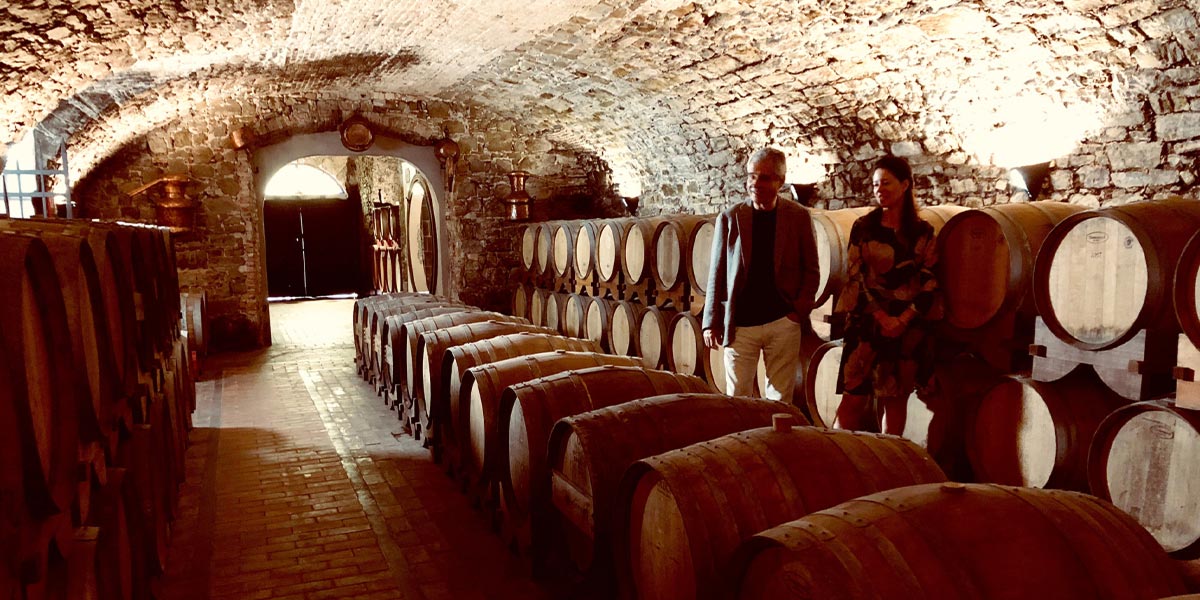 |
3sat, 10.50 a.m.
Travelling as in the 1950s: The "Reblaus Express" with its frame cars and the Heurigen wagon takes visitors back in time. Travelling is possible from May to the end of October. The nostalgic train set of the Lower Austrian transport organisation Növog shows that travelling can be more than just getting from A to B: namely pure enjoyment. Whether on the open platform between the carriages you let the landscape of the Wein- and Waldviertel pass by at a leisurely pace or you are pampered by a local winegrower in the Heurigen carriage with a glass of wine and the specialities of the region, here you experience one thing above all: deceleration. But the journey has even more to offer. On the 40-kilometre route from Retz to Drosendorf, film author Michael Ranocha stops at several places worth seeing. In Retz he visits the town's cellars, which are up to 20 metres deep and were dug into prehistoric sand, and in the Thayatal National Park he visits a "European primeval forest" including the forest wildcat, which was already considered extinct. He also meets a wine coachman in Weitersfeld who produces vegan organic wines. In Hessendorf he explores the fishing paradise, and in Langau he gets on water skis. A visit to Geras Abbey brings him the acquaintance of the herbal priest Felsinger, who cultivates his knowledge of medicinal herbs in the seclusion of monastic life. Finally, he ends up in the only town with a completely preserved town wall, namely Drosendorf, where he indulges in culinary delights at the "Golden Lamb". The Retz-Drosendorf local railway started operating in 1910 and has a short but eventful history behind it. In 2001, passenger transport was discontinued. The following year, the "Reblaus Express" was launched. You can travel 40 kilometres from the vineyards of Retz up to the Waldviertel, get on and off at ten railway stations and explore the surrounding area. Bicycle transport on the train is free of charge in your own 'Radlwaggon'.
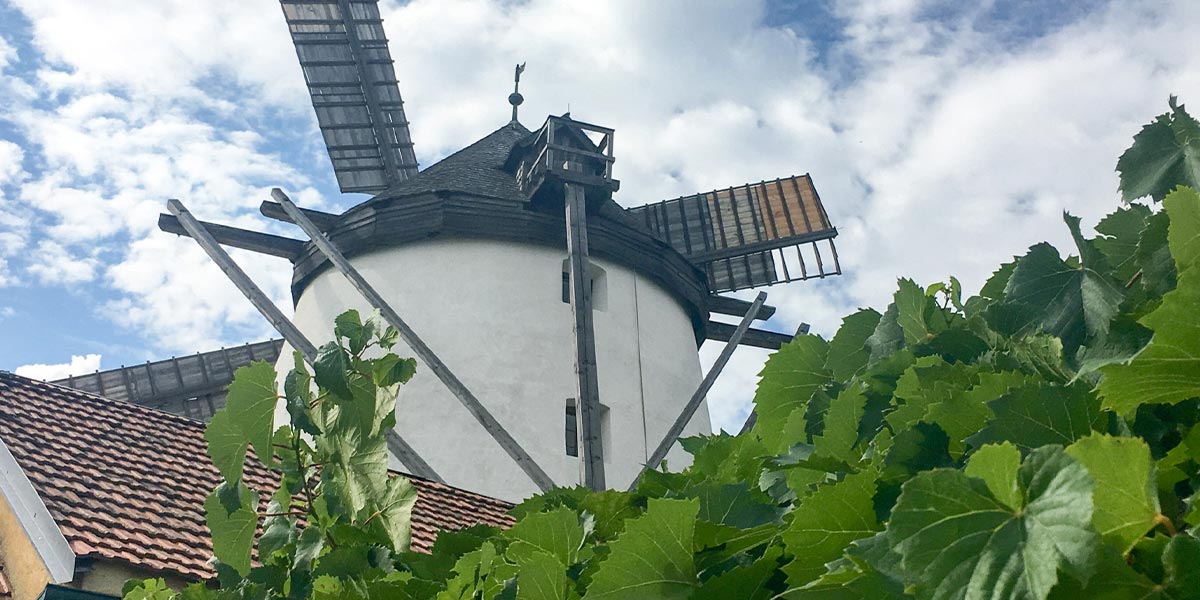 |
3sat, 12.05 p.m.
Collio, a wine-growing region in the extreme north-east of Friuli-Venezia Giulia, captivates with its hilly landscape, charming villages and culinary specialities. The wine there is first-class, spicy the vinegar and prosciutto. At the court in Vienna, the Collio was also called "the fruit chamber of the monarchy". Particularly popular in the ruling houses: the juicy cherries and the fruity white wine. The Felluga family and some other winegrowers were the first to start quality winegrowing in the Collio. The Collio hill country, manageable in its extent, offers a tremendous concentration of first-class wineries. The wine-growing area is also home to the largest number of autochthonous wines in Italy. The grappa produced from Picolit is also a taste experience in itself. The Domenis distillery near Cividale was one of the first to market grappa made from this grape variety and to elevate the marc brandy, which used to be discredited as a poor man's schnapps, to a spirit of the highest quality. Joško Sirk and his son Mitja ferment the wine into vinegar in barrique barrels. It has to be stored there for at least three years to mature into what is perhaps the best vinegar in Italy. Andrea D'Osvaldo, on the other hand, has dedicated himself to prosciutto. A special smoking process and the climate produce the special taste that is not called the "Stradivarius of ham" for nothing.
arte, 6.25 p.m.
Simple but refined dishes that tell of the history, culture and tradition of Piedmont. In the hilly landscape known as the Langhe, autumn is harvest time. But instead of harvesting grapes, Davide Porro and his grandfather Michele prefer to concentrate on snails. Breaded, they have been on the family's menu for generations. Nearby, in Alba, pasta maker Mauro Musso prepares the traditional Sunday dinner tajarin. He only leaves the ragú sauce to his mother, because Mamma Giuseppina still makes it best. As soon as one crosses the Po River, the visitor recognises a mosaic of rice fields that benefit from the region's abundant water resources. Igiea Adami, the "rice woman", relies on organic and on the old cultivation methods of the Mondine. Then as now, people eat the traditional panissa among friends and neighbours. Between the hills lies Turin, the capital of Piedmont. Once known as an industrial metropolis, the city has long since established itself as a cultural stronghold.
3sat, 6.45 a.m.
The Azores islands rise out of the Atlantic as the peaks of huge underwater volcanoes. The evergreen archipelago in the middle of the ocean attracts visitors with fascinating landscapes and idyllic villages. Whale watching, tours to extinct volcanoes, bathing in hot springs and hiking through forests and vineyards: the Azores offer island hopping to nine paradises for nature lovers, geotourists and water sports enthusiasts - far away from mass tourism. The series "Dream Places" presents the most beautiful travel destinations on earth. The selection ranges from dream beaches to natural landscapes and architectural sights.
3sat, 5.00 p.m.
Georgia is nestled between the Black Sea and the Caspian Sea, between the Greater and Lesser Caucasus. The film portrays the everyday life of the people living there. "I am a mountain child. I would never leave my home," says the young farmer Giorgi. His home is Swanetia, the northernmost region of Georgia, on the edge of Europe. Here the mountains are up to 5,000 metres high. The Svanetian icon painting in the small chapels is under special protection. The inhabitants of the port city of Batumi dream of becoming the Las Vegas of the East, while in Kakheti wine is still pressed in huge clay vessels, the kvevris. Everywhere, Georgians demonstrate their hospitality, culinary skills and drinking skills.
3sat, 6.00 a.m.
Corsica is a place of unique beauty. People live here who are addicted to the island and do everything to keep Corsica pristine and worth living. The Mediterranean island is the southernmost region of France. Corsicans and immigrant Germans take advantage of the island's many opportunities. They brew beer from chestnuts, grow aromatic plants or cultivate vines. Outside France, however, Corsican wine is often associated with cheap products. This is due to the simple mass-produced wines from the monocultures of the east coast, which account for two-thirds of the annual wine production. Little known are the award-winning wine regions of Ajaccio, CCorse Calvi, Muscat and Coteaux du Cap CCorse Figari, Patrimonio, Porto-Vecchio and Sartène.